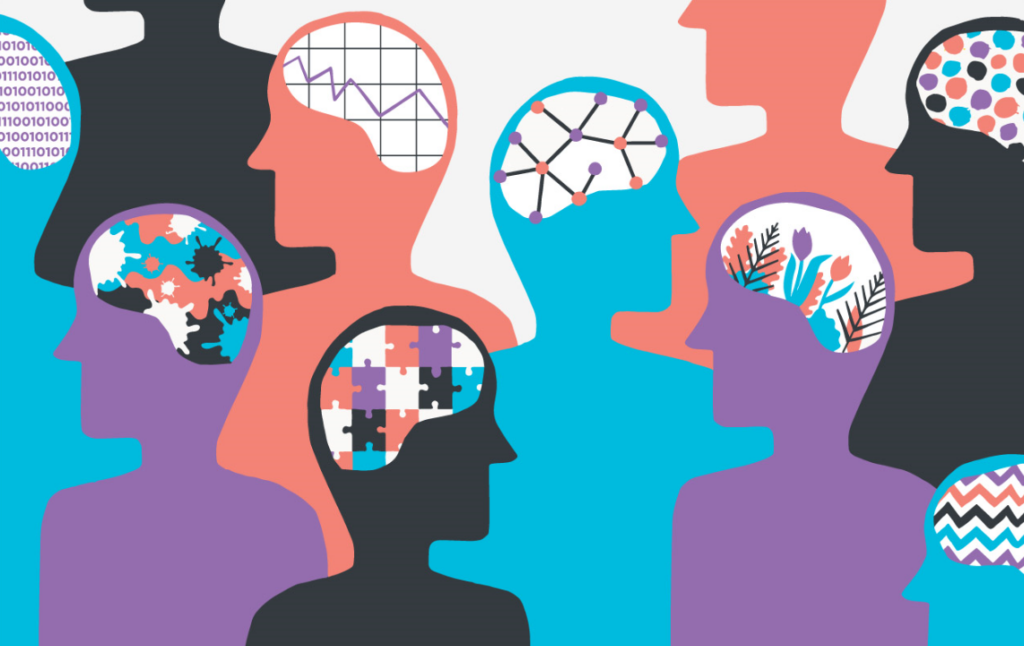Neurodiversity at Work – a personal story

Neurodiversity is the concept that all humans vary in terms of our neurocognitive ability – how we think and process information. Everyone has talents and things they struggle with. For some people the variation between those strengths and weaknesses is more pronounced, which can bring a specific talent but can also be very disabling sometimes.
Neurodiversity is usually associated with dyslexia, ADHD or autism, but mental health issues such as depression and social anxiety disorders can also affect how our brain processes things.
Only 16% of autistic adults in the UK are in full-time employment, according to the National Autistic Society, and 77% of unemployed autistic people say they want to work. There is a vast, high-potential pool of talents for employers to tap into and benefit from.
How can employees with neurodiverse traits put their talents to use and manage their difficulties at work? How can employers make the most of neurodiverse individuals’ unique talents? While neurodiverse colleagues may struggle with social skills and team activities, they tend to have above-average abilities when it comes to things like analysis, information processing, problem-solving and pattern recognition.
In terms of what employers can do to be neurodiversity smart, it’s important to develop an acceptance of neuro-difference and to celebrate neurodiverse strengths while taking steps to accommodate any specific challenges that an individual may face. In many cases, taking steps to be inclusive of neurodivergent people, from the recruitment and induction processes to roles descriptions and the physical work environment, will often result in benefits for all employees, job seekers and even customers.
In recruitment, there is a tendency amongst employers to hire who appear to tick ‘all’ possible boxes relating to a particular role, which is likely to exclude individuals with narrower and deeper strengths. The frequent requirement for ‘excellent communication skills’ in a role that actually requires excellent information and data processing could discourage applications from individuals with those essential skills.
Job descriptions should be very clearly demarcated into ‘must-have’ and ‘nice-to-have’ skills and experience. It’s better not to include skills such as ‘excellent communication skills’ as ‘must-haves’ if they are ‘nice-to-haves’. Make it easy for people to see what the core skills for the role are, and make it clear that you are happy to discuss reasonable adjustments. Small changes to the work or work environment can make a big difference to someone’s working life.
Consider alternative assessment methods beyond interviews, for example work trials, practical assessments and mini apprenticeships, and how the physical work environment affects wellbeing and performance, such as noise levels, lighting and equipment.
See the further signposting section at the end for more ideas and information.
A personal story
Alex Hagger, a colleague in Public Health at East Sussex County Council, has neurodiverse traits and shares his experience of how this affects him in the workplace.
What impacts your mental health? What techniques help you keep mentally well
I think anxiety is very hit or miss; sometimes you’re fine and then something just triggers you and you just get really anxious. Sometimes I do the ‘quick wins’ to reduce the number of tasks I have – this also helps me feel less overwhelmed, as does blocking time out in my diary. I try (and fail) at allowing time in between meetings, but I’m working on this by trying to be more disciplined with my time.
What’s your advice to others?
Find what works for you, get to know your triggers and signs when you’re struggling. I feel like the way to boost awareness is by being honest and open with people – they can’t help you if they don’t know you’re struggling. (…) Speak to your doctor for help too. I think that the stigma about taking medication doesn’t help, but sometimes you need it and that’s ok! (…)
Tell us about your experience of neurodiversity at work…
For me personally, I think sometimes, people can find me quite direct and wanting to get to the point as soon as possible. What I have found helpful is understanding my needs and being confident in myself. I’m always open about the fact I’m neurodiverse, and I’m quite high functioning; a lot of people who are neurodiverse, are. My mind flicks about lot and as a result, I don’t always convey what I mean or put it in understandable language. So, I have to slow down and make points individually and let people respond, or I’ll break it down and ask questions. (…)
What’s been helpful at work?
Having the right software and using the various functions within it helps. I also think making my managers aware and being up front about my neurodiverse and mental health needs has helped get me the support I need; if your manager doesn’t know you have these disabilities, how can they help? How do you get the support and understanding you need? It’s about being open and honest about your difficulties; you know your own strengths and weaknesses.
Further signposting:
CIPD’s Neurodiversity at Work Toolkit – it brings a list of things to consider when building a neurodiverse workplace and a lot of case studies – Neurodiversity at work (cipd.co.uk)
The Disability Confident Scheme – Disability Confident – Are you disability confident? (campaign.gov.uk)
Access to Work Scheme – Get support with reasonable adjustments – Access to Work: get support if you have a disability or health condition: What Access to Work is – GOV.UK (www.gov.uk)
Neurodiversity Awareness Training – Workplace neurodiversity training from The Brain Charity – The Brain Charity
Blog by the Wellbeing at Work team
